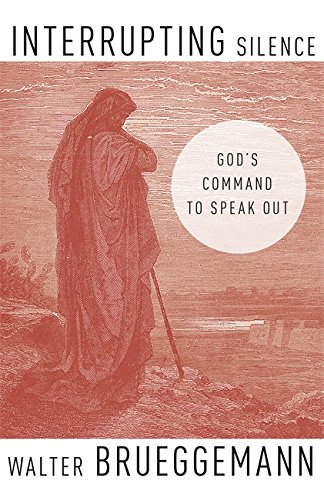Interrupting Silence by Walter Brueggemann
A book about justice, where Brueggemann analyses eight Biblical passages in which silence is broken. Deceptively simple prose; profoundly challenging ideas. Two reviews
 Interrupting Silence: God’s Command to Speak Out
Interrupting Silence: God’s Command to Speak Out
By Walter Brueggemann
Hodder and Stoughton
ISBN: 9781473686007
First review: Rosa Hunt
There are all sorts of types of silence, but the silence that this book addresses is the one where a dominant voice represses inconvenient speech. In other words, this is a book about justice.
Brueggemann analyses eight Biblical passages in which silence is broken. The first two are Old Testament passages that might readily be associated with injustice: the groaning of the Israelites in slavery in Egypt, and the refusal of the prophet Amos to be silenced by the royal court and temple.
The next passage is perhaps more surprising: Brueggemann analyses Psalm 32’s account of how the psalmist breaks his self-imposed death sentence by breaking his silence before God, the “faithful listener”.
Then follow four passages from the gospels, three of them notoriously difficult to understand and preach on! Brueggemann offers us a welcome hermeneutical key to the stories of the Syro-Phoenician woman, the boy who had a spirit which could only be cast out by prayer, the healing of blind Bartimaeus and the parable of the persistent widow. In each case Brueggemann considers the nature of the prevailing silence, how it had been imposed and maintained, and how it is broken. And in each case he shows that the breaking of silence is associated with the healing and liberation which Jesus brings.
The final passage which Brueggemann studies is the passage in 1 Corinthians 14, which forbids women from speaking in church. In this chapter, Brueggemann considers the role which the church has played, and continues to play, as a silencing and wounding institution.
Brueggemann couches his arguments in clear language and uses memorable metaphors. On one level, this makes the book an easy and enjoyable read. However, the deceptively simple prose contains profoundly challenging ideas. Brueggemann does not allow the texts to remain in the past but is constantly bringing them to speak truth to the contemporary political context. Moreover, each chapter is followed by a set of challenging questions for the reader to reflect on.
In writing this book, Brueggemann has committed his own act of silence-breaking, and he does not intend the reader to emerge from it unchanged.
Rosa Hunt is minister of Salem Baptist Chapel in Tonteg, South Wales, and part-time tutor with South Wales Baptist College
'Silence that needs to be broken' - second review by Alec Gilmore
Not one more book pleading for silence in a noisy, talkative, cold-calling world. Brueggemann's problem is not noise that needs to be silenced but silence that needs to be broken. Founded in Scripture, as always with Brueggemann, he identifies eight such silences. Whether he started with the texts or with the silences is unclear but doesn't matter.
First,
the silence-breaking cry of the slaves in Egypt (Exodus 1-15). As long as they keep their silence they remain slaves. Only when they 'groan under their slavery and cry out' (2: 23) are they taken seriously but when they break their silence Yahweh breaks his, 'a process that turns pain into joy'.
Next,
silence as a means of control. With Israel, a triad of exploitative labour, unjust taxation and excessive surplus wealth, in 'a world of royal authoritarianism and poetic (prophetic) interpretation', the prophets (whom Brueggemann calls 'poets') saw this as both unneighbourly and contrary to the will of God, and Amos (7:13) broke silence to say what few others could say, and what the beneficiaries of the system wanted neither to say nor to hear.
The Psalms (eg 32:3,5) explore and exploit
the self-imposed silence, whether from guilt, despair or a cri de coeur, and the transformative experience that can come through breaking it.
When Jesus gives the cold shoulder to a rude cry for help from a Gentile woman (Mark 7:28) she epitomises
the silence that will not go away by her refusal to let him get away with it, and when an African American preacher interprets a mute boy (Mark 9:14-29) as 'a figure for the "muteness" to which African Americans have been subjected and reduced in US society . . . robbed of their capacity to speak, or live, or grow in their own future' we see the contrast between the power to silence and the power to speak as Jesus breaks
the restraining power of silence to release new life, with prayer as 'a refusal to settle for what is'.
Similarly, the shout from Bartimaeus to Jesus (Mark 10:47-8) breaks
the silence of his disability and the crowd's attempt to silence him highlights the contrast between silence and the breaking of silence, raising crucial questions as to their motivation, while in a world where no widow would dare 'Speak Truth to Power' tne consequences of an encounter between a cynical and indifferent judge and a victimised, resourceless widow' (Luke 18: 2-3) demonstrate how important it is to break
the silence of conformity.
Finally, the Church as
a Silencing institution. True? Or false?
Seven seeds for seven sermons and a final chapter as an excellent starter for a discussion group. Who agrees? Who disagrees? Discuss.
The price is somewhat on the high side but it is a hardback and its value is out of all proportion to its size.
Alec Gilmore is a Baptist minister
Baptist Times, 05/03/2018